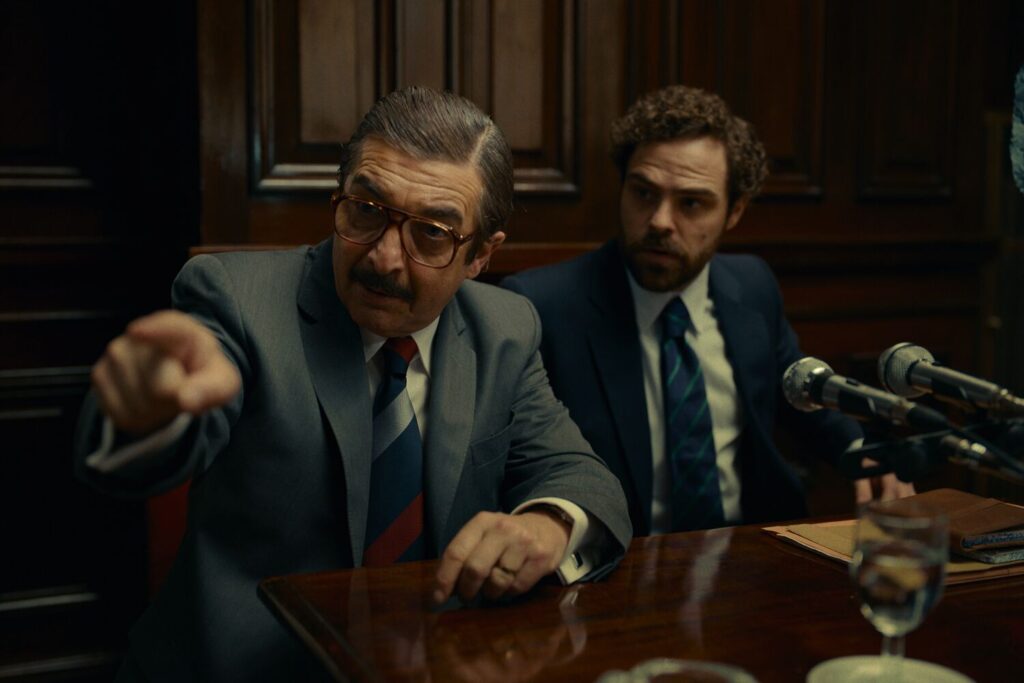Films about important historical moments are often marked by a heavy solemnity, a sometimes suffocating respectfulness that can make one forget that these events involved real people, human beings with passions and foibles. This is especially common when the subject matter is as dreadful as the 1970s-1980s military dictatorship in Argentina and its practice of “disappearing” — kidnapping, torturing, raping and killing — its own citizens.
Not so, “Argentina, 1985.”
The new Spanish-language film from Amazon — Argentina’s submission for the 2023 international feature Oscar — gives these crimes against humanity every ounce of weight they demand but never forgets the humanity of its characters. This is particularly true of its depiction of protagonist Julio César Strassera, the prosecutor assigned the seemingly impossible task of holding to account the military leaders responsible for these atrocities.
The film’s Strassera is no Superman. He is by his own estimation a man of little importance. “History was not made by guys like me,” he says, and it’s not false modesty. He’s not dynamic or particularly charismatic. In fact, until the events of the film, he didn’t have a record of standing up for justice against the powers that be.
In the hands of director and co-writer Santiago Mitre, co-writer Mariano Llinás and lead actor Ricardo Darín (“The Secret in Their Eyes”), Strassera is the slow-but-steady one in the story of “The Tortoise and The Junta: The Little Prosecutor Who Maybe Couldn’t, But Wouldn’t Quit.” He’s what one might call “endearingly competent.” The characterization they achieve is something rare and commendable: a lead who is interestingly uninteresting.
That’s due in no small part to the film’s depiction of the Family Strassera — Santiago Armas Estevarena as son Javier, Gina Mastronicola as daughter Veronica and Alejandra Flechner as wife Silvia. Their scenes feel informed and alive rather than obligatory. Each has a personality, especially gung-ho Javier. They have real-feeling relationships and small but telling moments among them. It grounds us in their world and makes us worry when the inevitable death threats begin.
It’s no comedy — not the “Hogan’s Heroes” of the Trial of the Juntas — but the humor of everyday life is evident throughout. And the absurdity of the task occasionally gets well-earned laughs, as when Strassera and a confidant are trying to think of veteran lawyers to recruit to their cause, only to realize how many of them side with the fascists they’re trying to convict: “… No, fascist. Super-fascist.” If you never thought you’d chuckle during a scene in which people are being accurately described as “super-fascist,” surprise!
Failing to recruit big names, Strassera is helped by group of young lawyers who join for different reasons, including his main ally, Luis Moreno Ocampo (Peter Lanzani). These characters, again, come across as explored humans, helping us root for them (as if we needed any encouragement, considering the horrors for which they’re seeking recompense).
Apart from the moving testimonies of surviving victims, the movie’s power comes from the desperate needs for justice and to prevent this authoritarian, terrorist scourge from ever taking hold again. The opening crawl informs us that Argentina had suffered vacillations between democratic governments and military coups for 50 years before the story begins.
Strassera and his team are tasked with facing down not only those who would violently discard the law in the name of “patriotism” but also those who would later defend those actions. The prosecutor tells the court and the country: “This is our opportunity; it may be the last one.”
‘Argentina, 1985’
In Spanish with English subtitles
Rated: R, for language
Running time: 2 hours, 20 minutes
Playing: Starts Sept. 30, Laemmle Royal, West Los Angeles; available Oct. 21 on Amazon Prime Video

